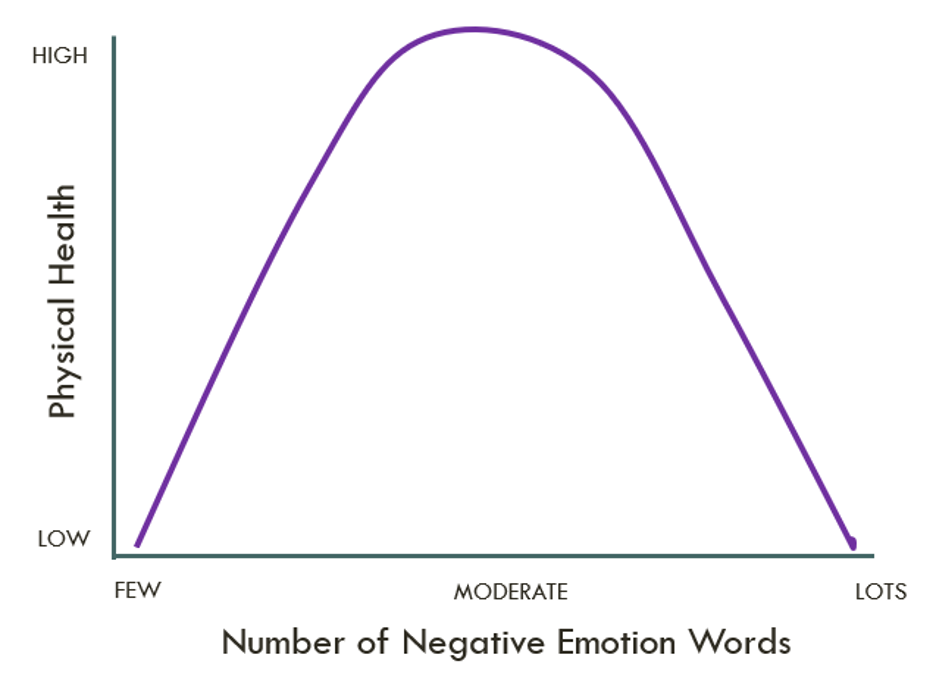Chapter 14 – Emotion Regulation
Expressive Writing – One Type of Confrontation
Let’s talk about two studies that investigate the effects of confrontation.
James Pennebaker developed an expressive writing paradigm to investigate the effects of using writing to confront past eliciting events that were emotional and significantly important to one’s life. In the basic laboratory study, participants are randomly assigned to an expressive writing or control group. In the writing group, participants come to the lab 3 to 5 days each week and spend 15 to 30 minutes each day writing about their “…very deepest thoughts and feeling about an extremely important emotional issue that has affected you and your life” (Pennebaker, 1997, p. 162). Participants pick the topic and may write about the same or different topics each day. Participants in the control group write about neutral topics. The dependent variables include a variety of psychological and physical outcomes.
Studies using the writing paradigm have found a variety of psychological and physical benefits (for the citations, review Pennebaker (1997)). Compared to control groups, writing groups showed better physical health – fewer doctors’ visits from pre-writing to post-writing, and better immune system functioning (more t-cells and natural killer (NK) cells, more Epstein-Barr antibodies after mono, and more Hepatitis B antibodies after receiving vaccine), and improved grades (Pennebaker & Francis, 1996; Pennebaker, 1997). Directly after writing, participants showed reduced skin conductance, reduced heart rate, and reduced corrugator activity. The writing group also showed better psychological health – better memory, more positive mood, and self-reported higher well-being. Psychologically, writing resulted in less self-reported negative feelings and depressive symptoms for people who typically suppress their emotions (Gortner et al., 2006). Finally, several behavioral outcomes occur after writing – including drinking less alcohol, receiving better grades in college, and missing less work. Overall, these findings suggest that we all should start a diary!
Pennebaker developed a linguistic coding system to further analyze the words participants use in their writing. The coding system (LIWC) categorized words into negative emotion words, positive emotion words, causal words (because, reason) and insight words (understand, realize). The number of words used in each category predicted physical health, but not mental health. Results indicated that:
- 1) Number of positive emotion words was positively correlated with better physical health.
- 2) A curvilinear relationship explained the relationship between negative emotions words and physical health. (see Figure 3)
- 3) Over time as participants increased the amount of causal and insight words as they wrote, they showed better physical health (Pennebaker et al., 1997).
- 4) Participants who started with messy and unclear writing that became clearer and more logical over time showed increases in physical health.
What do you think is happening when people write? Think about why people report the highest physical health when they are using a moderate number of negative emotion words. It might be that people who suppress would tend to use few negative words, but now the task of writing about emotions reduces suppression and its negative effects on health. It could be that when people write and use a moderate number of negative words they are effectively confronting and even re-appraising the situation. Maybe people with lots of negative emotion words do not have the working memory to confront or are using the strategy of rumination – and focus too much on their current feelings instead of changing their thoughts about the upsetting eliciting event.
Figure 3
Curvilinear Relationship between Amount of Negative Emotion Words and Physical Health

Long Description
The image is a line graph depicting the relationship between the number of negative emotion words and physical health. The x-axis represents the “Number of Negative Emotion Words” and is labeled with “Few” on the left, “Moderate” in the middle, and “Lots” on the right. The y-axis represents “Physical Health,” labeled with “Low” at the bottom and “High” at the top. A purple curve arches upward, starting low on the left, peaking in the middle, and descending on the right, forming an inverted U shape. This suggests that a moderate number of negative emotion words is associated with higher physical health.

